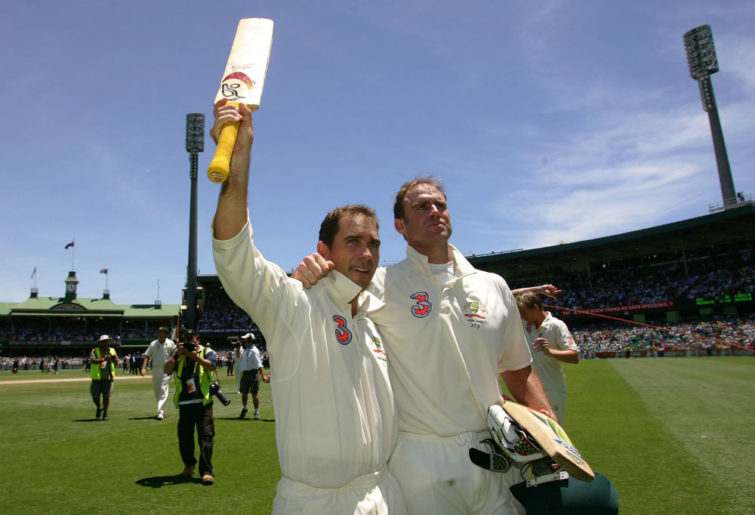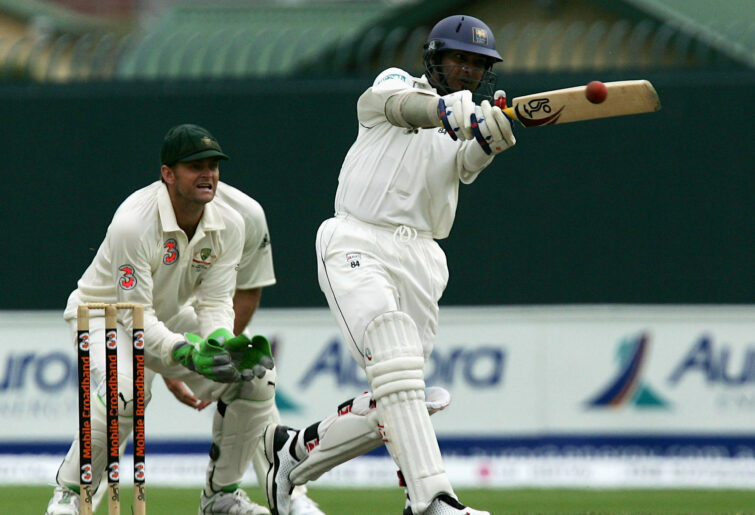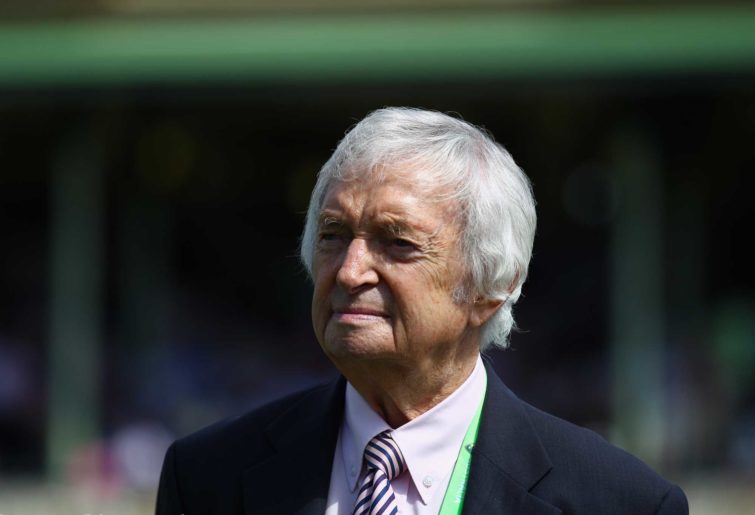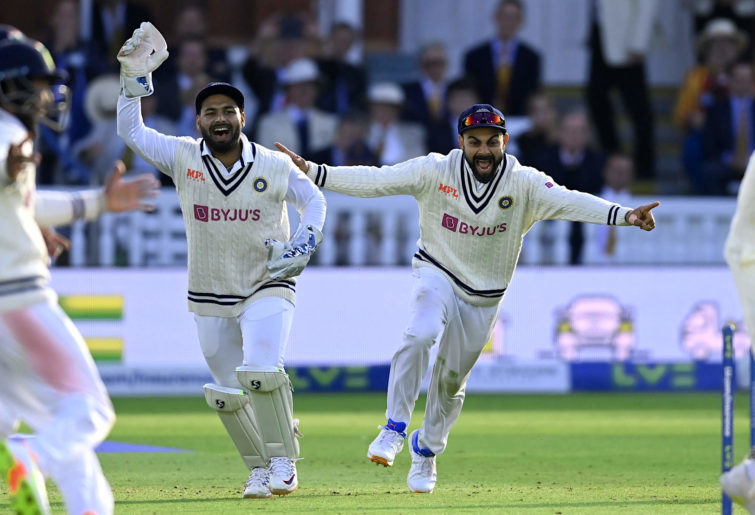This team is stronger than the one for September, and arguably one of the best in the entire series. Whether batting or fielding, the first hour of each innings will be exciting to watch.
Its opening batsmen are as aggressive as its middle-order is solid, while its bowling boasts both intimidation and variety. October has also proven to be a fertile month for champion all-rounders.
1. Virender Sehwag (India, born 20 October 1978)
104 Tests, 2001-2013, 8586 runs at 49.34, 23 centuries, 91 catches
Sehwag is the fastest-scoring specialist batsman of all time, with a career strike-rate of 82.2. Cricinfo named him in its all-time India XI in 2010. It also recently rated two innings by him among the best 100 ever played.
He scored 309 from 375 deliveries in Multan in 2004, to spearhead a comprehensive victory over arch-rivals Pakistan. He later scored a match-winning 201 not out from 231 balls in Galle in 2008, out of a team total of 329.
While lack of footwork was an alleged weakness, he scored almost two-thirds of his runs in boundaries, and played many large innings. Three other notable ones were 319 against South Africa in Chennai in 2007-08, 293 against Sri Lanka in Brabourne in 2009-10, and 254 in Lahore in 2005-06. Each was made faster than a run-a-ball.
2. Matthew Hayden (Australia, born 29 October 1971)
103 Tests, 1994-2009, 8625 runs at 50.73, 30 centuries, 128 catches
The left-handed Hayden is one of the most prolific opening batsmen ever, and was also a fine catcher. His peak ICC batting ranking in 2002 is the 13 highest of all time. Appropriately, he amassed his highest score of 380 in October, against Zimbabwe at the WACA in 2003-04.
In India in 2000-01 he scored 549 runs at 109.80. Other highlights included twice amassing two centuries in the same match, and scoring a century in four consecutive games against South Africa in 2001-02.

Justin Langer and Matthew Hayden. (Photo by Hamish Blair/Getty Images)
3. Neil Harvey (Australia, born 8 October 1928)
79 Tests, 1948-1963, 6149 runs at 48.42, 21 centuries, 64 catches
The left-handed Harvey was renowned for his superb footwork and stroke-play, and for his outstanding fielding. After debuting at 19, he scored six centuries in his first 13 innings. The Australian Cricket Board selected him in its Test Team of the 20th Century.
Cricinfo recently rated his innings of 151 not out in Durban in 1949-50 as the seventh-best ever played. It enabled Australia to reach a 336-run victory target on a difficult pitch, after the game’s two preceding team totals had been just 75 and 99.
Other highlights included twice scoring four centuries in a series against South Africa, amassing 834 runs at 92.66 at home to South Africa in 1952-53, and taking six catches against England at the SCG in 1962-63. When Australia defeated the West Indies by just one wicket at the MCG in 1951-52, his contribution included four run-outs.
4. Jacques Kallis (South Africa, born 16 October 1975)
166 Tests, 1995-2013, 13,289 runs at 55.37, 45 centuries, 292 wickets at 32.65, 200 catches
Kallis is the game’s most prolific all-rounder. He generally batted at No.4, bowled medium-pace at second change, and caught superbly in slips. His peak ICC batting ranking in 2007 is the 13th-highest of all time, and his all-rounder ranking in 2002 the third-best. Cricinfo named him in its all-time South Africa XI in 2010.
Twice in the same game he both scored a century, and took five wickets in an innings. Only Sachin Tendulkar and Ricky Ponting have scored more runs, and Tendulkar more centuries.
5. Billy Murdoch (Australia and England, born 18 October 1854)
19 Tests, 1877-1892, 908 runs at 31.31, two centuries, 14 catches, one stumping
Murdoch was arguably the finest 19th century batsman after WG Grace, with a technique suited to under-prepared pitches. He captained Australia on its first three Test tours, and was also a capable wicketkeeper. He later represented England, and died while a spectator at a Test match.
He scored both of his centuries at The Oval. In 1880, his defiant 153 not out from 358 deliveries enabled Australia to recover from a hopeless position, and briefly entertain hopes of victory. In 1884, his 211 from 525 balls was Test cricket’s first double-century.
6. Kumar Sangakkara (Sri Lanka, born 27 October 1977)
134 Tests, 2000-2015, 12,400 runs at 57.40, 38 centuries, 182 catches and 20 stumpings
Sangakkara was a superb left-handed batsman, and kept capably in 48 of his Tests. His peak ICC batting ranking in 2007 is the seventh-highest of all time. Cricinfo named him in its all-time Sri Lanka XI in 2010.
Only five batsmen have scored more Test runs, and only Don Bradman more double-centuries. Against India in Colombo in 2006, he and Mahela Jayawardene shared a third-wicket partnership of 624 runs.

(Photo by Quinn Rooney/Getty Images)
Other highlights included innings of 319 and 105 in Chattogram in 2013-14. Against Bangladesh in Kandy in 2007, he scored 222 runs in a single day. While playing as a wicketkeeper in Lahore in 2001-02, he also amassed an innings of 230.
7. Imran Khan (Pakistan, born 5 October 1952, captain)
88 Tests, 1971-1992, 3807 runs at 37.69, six centuries, 362 wickets at 22.81
Imran is one of the game’s greatest all-rounders, and worth selection as a batsman or pace bowler alone. His peak ICC bowling ranking in 1983 is the third-highest of all time, while his all-rounder ranking for the same year is sixth. Cricinfo named him in its all-time Pakistan XI in 2010. He led his nation to World Cup victory in 1991-92, and to three drawn series with the West Indies at their peak.
His personal highlights included eight Player of the Series awards. He also took 10 wickets in a match on six occasions. His best innings hauls were 8/58 against Sri Lanka in Lahore in 1981-82, and 8/60 against India in Karachi in 1982-83.
During the final decade of his career he averaged 51.34 with the bat, and 19.16 with the ball. In 23 games against arch-rivals India he scored three centuries and averaged 51.95 with the bat, while also taking 94 wickets.
8. Richie Benaud (Australia, born 6 October 1930, vice-captain)
63 Tests, 1952-1964, 2201 runs at 24.45, three centuries, 248 wickets at 27.03, 65 catches
Benaud was an inspiring captain, aggressive batsman, superb fieldsman, and match-winning wrist-spinner whose speciality was the flipper. His ICC all-rounder ranking peaked in 1959 as the fifth-highest of all time.
In South Africa in 1957-58 he scored 329 runs at 54.83 with two centuries, and took 30 wickets at 21.93. In 12 games on the sub-continent, he took 71 wickets at 19.32. His most famous bowling performance was at Old Trafford in 1961, when he took 6/70 to trigger an England collapse and 54-run victory that retained the Ashes. Cricinfo recently rated it among the best 100 bowling performances of all time.

Richie Benaud (Photo by Ryan Pierse/Getty Images)
9. Wilfred Rhodes (England, born 29 October 1877)
58 Tests, 1899-1930, 2325 runs at 30.19, two centuries, 127 wickets at 26.96, 60 catches
Rhodes is one of England’s finest left-arm orthodox slow bowlers and all-rounders, and his tally of 4187 first-class wickets will never be surpassed. On debut aged 21, he batted at No.10. A decade later, he was reborn as an opening batsman whose 40 stands with Jack Hobbs averaged 58.82 runs.
In 1903-04, he took 31 wickets against Australia, including 15/124 at the MCG. Eight years later in 1911-12, he and Hobbs shared a 323-run opening partnership at the MCG. WWI interrupted his career when he was at his peak. Recalled at the age of 49, he had match figures of 6/79 in an Ashes-winning defeat of Australia in 1926. He played his final Test at the age of 52.
10. Ray Lindwall (Australia, born 3 October 1921)
61 Tests, 1946-1960, 1502 runs at 21.15, two centuries, 228 wickets at 23.03
Lindwall was a superb fast bowler who delivered late swing, accurate yorkers, skiddy bouncers and slower balls with impeccable control, and bowled more than 40 per cent of his victims. His action was likened to that of boyhood hero Harold Larwood. His career was shortened by WWII, which only ended when he was already 24 years of age.
In England in 1948, he took 27 wickets at 19.62 including a haul of 6/20 at The Oval. On his next Ashes tour in 1953 his tally was 26 wickets at 18.84. Other highlights included 7/38 against India in Adelaide in 1947-48, 7/43 in Chennai in 1956/57, and 7/63 against England at the SCG in 1946-47. He scored the first of his two centuries from just 90 balls against England at the MCG in 1946/47.
11. Allan Donald (South Africa, born 20 October 1966)
72 Tests, 1992-2002, 330 wickets at 22.25
Donald is his nation’s greatest-ever fast bowler, and boasted an outstanding career strike-rate of one wicket from every 47 balls. Cricinfo named him in its all-time South Africa XI in 2010. His figures would have been greater still but for already being aged 25 when South Africa regained Test status.
In the 1998 calendar year he took 80 wickets from 14 games, a tally that has been bettered just three times. In the 33 games that South Africa won when he was a team member, he took 187 wickets at 16.79. He was equally effective away from home, with 153 wickets at 22.96.
Imran and Benaud will lead the side with flair. Each enjoyed great success in charge of his respective nation. The team actually contains eight Test skippers in total, the most of any side in this series.
The Bazball-style opening pair of Sehwag and Hayden will regularly get their side’s innings off to a fast start. For that reason, each was preferred to the far more conservative Geoffrey Boycott, Bill Ponsford or Mark Taylor.
The middle-order of Harvey, Kallis and Murdoch will be solid rather than spectacular. It was tempting to include the elegant Aravinda de Silva or Martin Donnelly.
Sangakkara’s selection as wicketkeeper enabled the inclusion of a fifth genuine bowler. Murdoch’s presence gives the team a back-up gloveman. Alternatives included Brad Haddin, Rashid Latif and Rishabh Pant.

Rishabh Pant and Virat Kohli (Photo by Gareth Copley/Getty Images)
All-rounders are one of the side’s greatest strengths. Kallis, Imran, Benaud, Rhodes and Lindwall would provide valuable insurance with the willow in the unlikely event that the entire top-order had a collective bad day. The inability of Tony Greig to make the team further emphasises that October was a great month for the birth of all-rounders.
Donald, Lindwall and Imran will comprise a formidable new-ball trio, with support from Kallis. Their eligibility prevented John Snow and Courtney Walsh from making the side. The healthy pool of candidates also kept out Bart King, the USA’s best-ever player and one of the finest of the Golden Age of Cricket.
The team’s slow bowling is strong. Benaud’s right-arm wrist-spin and Rhodes’ left-arm finger-spin will complement each other and cover any foreseeable match conditions. While the unselected Anil Kumble and Johnny Briggs bowled in the same two styles, they did not quite match the chosen pair in quality.
The side’s fielding is in good hands, literally. Kallis, Benaud and Hayden will occupy the slips cordon, while Harvey will patrol the covers.
Next month, I’ll name arguably the most dynamic and watchable team of this entire series. It would both get turnstiles clicking, and give opponents sleepless nights.

































































































